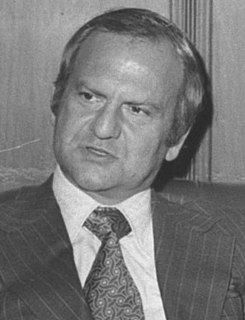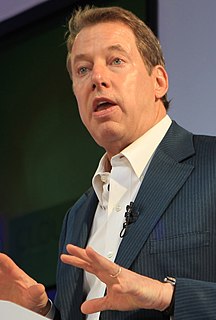A Quote by Stephen Fry
One of the most intensely unlikeable figures of the twentieth century, fanatical anti-Semite, enemy of labour unions and proud recipient of medals from Nazi Germany, where Hitler held him in veneration, Henry Ford was also an employer who paid his workers more than his competitors, an innovator who pioneered the assembly line and a visionary whose part in the creation of the twentieth century was so great that Aldous Huxley, in his Brave New World, prefigured a society whose calendar was divided into BF and AF-Before Ford and After Ford.
Quote Topics
After
Also
Anti
Assembly
Assembly Line
Before
Brave
Brave New World
Calendar
Century
Competitors
Creation
Divided
Employer
Enemy
Figures
Ford
Germany
Great
Held
Henry
Him
His
Huxley
Innovator
Intensely
Labour
Line
Medals
More
Most
Nazi
Nazi Germany
New
New World
Paid
Part
Proud
Recipient
Society
Than
Twentieth
Twentieth Century
Unions
Veneration
Visionary
Whose
Workers
World
Related Quotes
Historical fact: People stopped being people in 1913. That was the year Henry Ford put his cars on rollers and made his workers adopt the speed of the assembly line. At first, workers rebelled. They quit in droves, unable to accustom their bodies to the new pace of the age. Since then, however, the adaptation has been passed down: we've all inherited it to some degree, so that we plug right into joy-sticks and remotes, to repetitive motions of a hundred kinds.
Film is more than the twentieth-century art. It's another part of the twentieth-century mind. It's the world seen from inside. We've come to a certain point in the history of film. If a thing can be filmed, the film is implied in the thing itself. This is where we are. The twentieth century is on film. You have to ask yourself if there's anything about us more important than the fact that we're constantly on film, constantly watching ourselves.
Kafka was certainly one of the great literary talents of the twentieth century, but he did not find his way to his own style until the age of nearly 30, so rather late. The disciplined immersion in unconscious psychical material is something he also learned only after long years of practice. When he succeeded in doing it for the first time - in the story The Judgement - it put him in a euphoric mood. He wanted to experience this again and again; the act of creation made him happy and proud.
It has been said that the three great develpments in twentieth century science are relativity, quantum mechanics, and chaos. That strikes me the same as saying that the three great developments in twentith century engineering are the airplane, the computer, and the pop-top aluminum can. Chaos and fractals are not even twentieth century ideas: chaos was first observed by Poincare and fractals were familiar to Cantor a century ago, although neither man had the computer at his disposal to show the rest of the world the beauty he was seeing.
Ashton Ford will come as something of a surprise to those of you who have been with me over the years. This is not the same type of fiction that established my success as a novelist; Ford is not a gutbuster and he is not trying to save the world from anything but its own confusion. There are no grenade launchers or rockets to solve his problems and he is more of a lover than a fighter. I have grown, I hope, both as a person and as a writer, and I needed another vehicle to carry the creative quest. Ashton Ford is that vehicle.
One of the major changes in attitude that occurred in the world of art as we moved from the nineteenth into the twentieth century was that the twentieth century artist became more involved with personal expression than with celebrating exclusively the values of the society or the church. Along with this change came a broader acceptance of the belief that the artist can invent a reality that is more meaningful than the one that is literally given to the eye. I subscribe enthusiastically to this.
Today's Uncle Tom doesn't wear a handkerchief on his head. This modern, twentieth-century Uncle Thomas now often wears a top hat. He's usually well-dressed and well-educated. He's often the personification of culture and refinement. The twentieth-century Uncle Thomas sometimes speaks with a Yale or Harvard accent. Sometimes he is known as Professor, Doctor, Judge, and Reverend, even Right Reverend Doctor. This twentieth-century Uncle Thomas is a professional Negro -by that I mean his profession is being a Negro for the white man.
The three auto companies in the United States, they're all scrambling to come up with a plan, some way to reinvent themselves. Well this week Ford did its part. Ford unveiled a new hybrid, the Ford Fusion, which will get almost 40 miles to the gallon. Isn't that amazing? Yeah, and when asked how much it would cost, a spokesman for Ford said, '$25 billion.' They just want that money; they don't care. That's without mud flaps.
When Oscar Niemeyer died on December 5, 2012, ten days before his 105th birthday, he was universally regarded as the very last of the twentieth century's major architectural masters, an astonishing survivor whose most famous accomplishment, Brasilia, was the climactic episode of utopian High Modern urbanism.


































